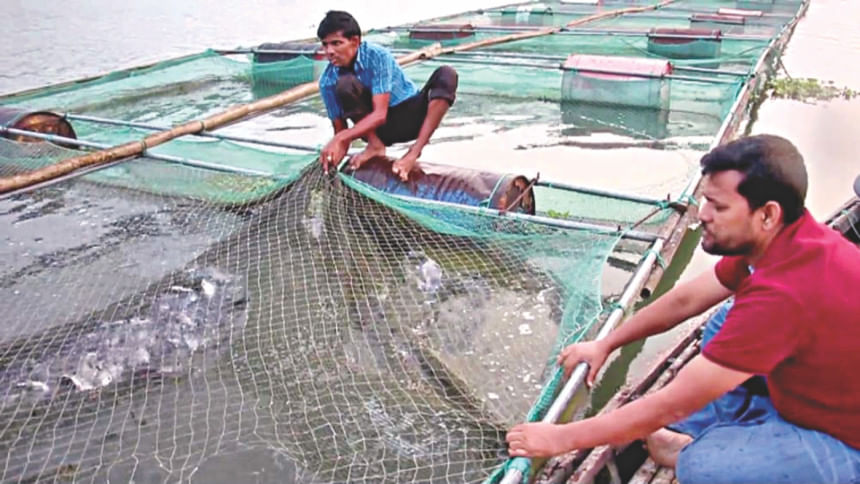Hobby turns out to be fortune

Hafizur Rahman, 40, of Ratanpur village in Pabna's Faridpur upazila, found a hobby in a river. Well, at first he thought he'd found a hobby. As it turned out it was more than that. He'd actually discovered a bit of a fortune.
It happened in 2010 on a fateful trip to Chandpur where he saw fish being raised in boxes placed in the Dakatia river. “When I returned home,” he says, “I thought to do the same in the Boral river beside my house.”
In 2011, he began with 10 boxes made of iron rods and nets, each measuring about 20 feet by 10 feet, with a depth of six feet. In each box he stocked at least 1,000 fry at a cost of Tk 20,000. His hobby proved successful. An initial profit of Tk 2 lakh inspired him to expand.
Hafizur added a further 40 boxes.
“I have 50,000 telapia fish in the 50 boxes,” he says. “After about six months they weigh up to 500 grams each.” Hafizur can produce at least 40,000 kilograms of mature fish from his project, which will bring earnings of up to Tk 12 lakh.
“Raising the fish in river boxes reduces production costs,” Hafizur explains. “The fish don't need medicinal support because the flowing river water suits them. I only provide dry food to promote fast growth.” In addition, in-river fish farming avoids the expense of pond digging and needing land.
With the cost of running one box at around Tk 15,000 per annum, which can realise up to Tk 40,000 in fish sales, it's a style of pisciculture that maximises return while minimising required investment, Hafizur says.
Hafizur's efforts have impressed Ratanpur's villagers. “When Hafiz Bhai started working on his river boxes we thought he was having a joke with us,” says one villager, Abdur Razzak. “We never imagined this kind of pisciculture could be so profitable.” Following Hafizur's lead, from last year Razzak also began cultivating fish in boxes in the Boral River. He already has 40 boxes of his own and is hoping to earn a minimum of Tk 8 lakh this year.
Like him, Pavel Hossain who was previously unemployed has taken up this method of fish farming, with 50 boxes expected to bring in an income of Tk 10 lakh.
“Hafizur has achieved great success with his river box fish farming,” says district fisheries officer Abdul Jalil. “He has inspired others to start such projects in place of traditional pond fish farms. It looks as though this could be something of a pisciculture revolution.”
For his efforts, Hafizur received national awards from the fisheries and agriculture ministries in 2014. “Many unemployed villagers are taking up river box fish farming, aiming at quick profits,” Hafizur says proudly.

 For all latest news, follow The Daily Star's Google News channel.
For all latest news, follow The Daily Star's Google News channel. 



Comments